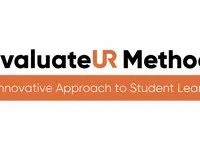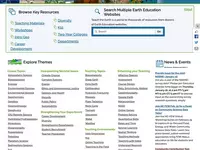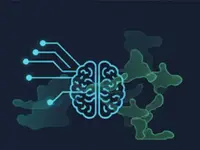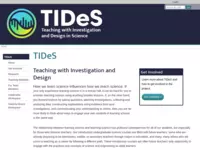What's New @ SERC
Below, find a selection of new teaching materials found at SERC-hosted websites. Jump down to view more new and recently updated SERC-hosted resources.
Reviewed Collections ▼ Department & Program ▼ Teaching Resources ▼ More Resources! ▼SERC Partnerships ▼What's coming from SERC ▼
The SERC website has new features!
SERC's Favorites feature, rolled out over the past year, allows you to keep track of SERC pages you use frequently. Return to them easily and optionally get emailed when they are updated. You can even build and share collections of pages.
The new Community Contribution Tool allows educators who use SERC-hosted activities to share their modifications and improvements back to the community. If you've made an existing activity even better for your students let us all know what you did!
SERC is now on Instagram, Threads, LinkedIn and BlueSky! Check us out on all the socials: ![]()
![]()
![]()
![]()
![]()
Reviewed Collections
CLEAN Climate Literacy and Energy Collection
The CLEAN site includes more than 800 ready-to-use resources that have been reviewed by educators and scientists for elementary, secondary and higher education settings. The website features guidance for teaching about climate and energy, including Spanish-language versions and a series of webinars, which have been recorded for viewing at your convenience. In addition, guidance is given for culturally-relevant climate literacy teaching and climate mental health, as well as for creating your own NGSS-aligned units, utilizing CLEAN resources. The resources are complimented by the CLEAN Network: a professionally diverse community of climate literacy stakeholders who engage through an active email list.
Cutting Edge Exemplary Collection
The Exemplary Collection showcases the best online teaching activities relevant to NAGT's community of Earth educators as scored by peer review on scientific veracity; alignment of goals, activity, and assessment; pedagogical effectiveness; robustness; and completeness of the Activity Sheet. In 2022, we completed the review of the two-decade legacy of On the Cutting Edge and the collection continues to grow each year as new activities are submitted and reviewed so check back regularly!
New Teaching Computation Using MATLAB Activities Available
Explore our newly peer-reviewed activities from the most recent Teaching Computation Using MATLAB workshop. These activities showcase high-quality teaching with MATLAB. Check out the full exemplary collection and consider submitting your own MATLAB teaching activity for the next round of peer review. Descubre las actividades en Español del Taller Virtual para Educadores: Enseñando Pensamiento Computacional con MATLAB. Estas actividades, revisadas por pares, destacan por su calidad. ¡Consulta la colección y disfruta enseñando con MATLAB!
Search Teach the Earth
The Teach the Earth portal is an entry point for educators in the geosciences and related fields to find a broad array of teaching and learning resources. Consolidating thousands of resources from dozens of independent projects, this NAGT-managed hub provides Earth educators a "one-stop shop" where they can search multiple Earth Education websites for a specific course or activity or browse resources by topic, level, pedagogic strategy, and much more.
Department and Program Guidance
EvaluateUR Methods
The EvaluateUR Method provides an online guided evaluation process designed for programs that support research experiences for undergraduates. The core EvaluateUR offering that supports independent summer and academic-year research has been streamlined, and the E-CURE version that supports course-based undergraduate programs now has multiple variants to support different class sizes and durations. An E-Internship variant has been added to support students in internship programs. We've also added a set of downloadable metacognitive cards that can be used in a variety of learning contexts.
Cultural Change in the Geosciences (C-ChanGe)
For eight months, the Cultural Change in Geoscience (C-ChanGe) project worked toward a vision of the future where all people at each stage of their career experience academic geoscience as a safe and welcoming environment where they feel empowered to learn and contribute without stifling their identities, and where the community recognizes contributions from everyone. Even though the project was prematurely terminated, it developed a 4-month professional development series that the community can use to begin addressing cultural change issues at the department scale.
Business And Science: Integrated Curriculum for Sustainability
The Business And Science: Integrated Curriculum for Sustainability (BASICS) team developed, piloted, and evaluated transdisciplinary curriculum modules for undergraduate students that combine STEM and business, with a focus on the wicked problems of sustainability in a global economy. Connected to the module development was an effort to build strategic capacity for institutional transformation by changing the attitudes and perspectives of individuals and groups of faculty toward transdisciplinary teaching, learning, and collaborative curriculum development. New this year on the BASICS website is a set of resources documenting the institutional transformation approach, including the use of local learning communities, outcomes from those communities, and individual faculty perspectives on the work and use of the materials.
Building Leadership Capacity to Support Two-Year College and Disciplinary Society Collaborations Workshop
This virtual workshop gathered 2YC participants and disciplinary society representatives with a focus on leadership development and promoting disciplinary and cross-disciplinary 2YC-disciplinary society collaborations to build community and foster cross-disciplinary engagement. Leadership development sessions included leadership approaches (using Bolman & Deal, 2017), leading change and bringing others along, building strategic relationships, building your leadership tool kit, and sustaining change. Recorded plenaries are available.
Teaching Resources
New Guidance on Finding Teaching Resources That Match your Needs
This brief guide highlights a set of proven strategies for effectively exploring SERC collections. From automated recommendations to our enhanced Favorites features, you'll learn how to get the most out of SERC sites.
Community Contribution Tool
Through a new NSF-funded project we've developed a new 'Community Contribution Tool.' After initial testing at the 2024 Earth Educator's Rendezvous we have revised this tool and made it available on every SERC-hosted activity page. You can use it today by following the 'Used this activity' button near the top of every activity page. This tool provides a way for educators who've used SERC-hosted activities to share their experiences back with the community. Have you modified an activity, combined it with new data, or want to share how it played out with your students? With this new tool you can document and share those resources and experiences directly through the existing activity page. Community contributions will be displayed within the original activity page, allowing educators to learn from each other's real-world experiences.
AI in Geoscience Education
This new site is a space where the geoscience education community can share our collective experience of how AI, and in particular generative AI, is impacting what and how we teach. The site currently provides some initial exploration of questions like: Can AI make my work as an educator easier? How do I guide my students in using AI appropriately and ethically? How is AI impacting geoscience as a discipline? If these issues are important to you, consider signing up for updates about future events and resources including an upcoming webinar.
The Math Your Earth Science Majors Need, When They Need It
Undergraduate majors in the Earth and environmental sciences also often struggle with effectively applying math in Earth science. This project, The Math Your Earth Science Majors Need, is developing co-curricular modules to support majors-level students on math and statistics concepts relevant to majors-level courses. The math questions and practice problems are drawn from a variety of Earth sciences sub-disciplines, so students have the opportunity to use math within the scientific context on a range of applications. Math classes taken in math departments, while valuable, often fail to give students practice using math in their own subject area and students are often not able to effectively transfer the skills themselves.
Teaching with Investigation and Design in Science (TIDeS)
The Teaching with Investigation and Design in Science (TIDeS) project supports faculty to develop and implement curricular materials for introductory undergraduate science courses that focus on science investigation and engineering design. The aim of the project is to prepare future teachers by exposing them to discourse-filled, context-rich, inclusive classrooms on the premise that teachers should learn science the way they are expected to teach it. SERC is involved both through support of the rubric-driven curriculum development process and a multi-faceted evaluation making use of qualitative and quantitative methods to assess project objectives.
More SERC-hosted resources
Increase the Success of Students in Your Courses
SERC invites you to participate in active reflection and discussion on teaching practice with higher education colleagues from across the disciplines in an upcoming virtual community conversation series. The series aims to provide STEM faculty, lecturers, and teaching assistants with professional development around practices that are known to positively affect student success in undergraduate classrooms. The series consists of three virtual sessions in November, 2025, and participants can register for 1, 2, or 3 of the sessions that fit their interests and schedule.
Teaching with Geodesy
Through a partnership with the EarthScope Consortium (formerly UNAVCO), this site now reflects the current state of the art in Teaching about Geodesy: the science of accurately measuring the Earth's size, shape, orientation, mass distribution and how these vary with time. The site includes more than 100 teaching activities, videos and supporting resources. They span undergraduate and secondary audiences and include resources for both classroom and field courses. The site is an entry point to Geodesy materials from multiple SERC-hosted projects and includes undergraduate teaching activities previously held on the original UNAVCO site.
ITYC Summit

NC-FEW
NC-FEW is a community and hub to support the emergence of interdisciplinary educational efforts focused on food, energy, and water systems in a wide array of educational contexts. SERC worked with NC-FEW leadership in developing virtual and in-person events and evaluating the project's impact and outcomes. The site includes a set of 11 recorded virtual workshops with experts across the Food-Energy-Water Nexus.
SERC Partnerships
Advancing Research Impact in Society (ARIS) center
SERC serves as the external evaluator for the ARIS center. ARIS provides resources and professional development and supports communities and researchers in promoting positive societal impact of research. Two key efforts where SERC contributed as researchers or evaluators include the Rutgers ARIS Broader Impacts Toolkit and a Special Issue on the Advancing Research Impact in Society (ARIS) Broader Impacts Toolkit Project that documents case studies of institutional efforts to promote research impacts.
NORDP Consultant Program
SERC applies a mixed-methods approach to the external evaluation of the NORDP Consultant Program. The Program partners cohorts of emerging research institutions (ERIs) are partnered with NORDP consultants in order to build and implement strategic and sustainable plans that grow institutional capacity for research. Given the unique assets and contexts of ERIs, the mixed-methods approach grounds the evaluation in the experiences of both the institutional partners and the consultants in order to characterize the unique journeys of the participants throughout the program, inform program leadership decision-making, and assess the overall program and its impact on all participants.
Polar STEAM
SERC serves as the external evaluators for the Polar STEAM project, which facilitates partnerships between educators, artists and writers and polar researchers through virtual and in-person experiences. SERC provides formative and summative evaluation of the center and of participant experiences.
OOI Ocean Data Labs
As the external evaluators for the OOI Ocean Data Labs project, SERC helps project leaders understand the participant experience in professional development and authoring teaching modules; the broader teaching contexts in which instructors teach with Data Labs content (e.g. Lab manual, data explorations, OOI Nuggets, Python Notebooks), and the progress towards project goals.
Enabling Partnerships to Increase Innovation Capacity (EPIIC)
SERC serves as the external evaluator for EPIIC which is an NSF program where three rounds of awarded consortia of institutions work as cross-institutional teams to drive key technologies and support innovation ecosystems that increase the institutions' capacity to grow external partnerships. SERC assesses the overall program across the awards and serves as the external evaluator for the NSF PI meetings.
Megalopolitan Coastal Transformation Hub (MACH)
SERC serves as the external evaluator for the MACH project which is a collaboration of thirteen university and institutional partners pursuing integrated, co-produced research. In addition to ongoing formative evaluation and thought partnership activities, our evaluation plan includes an annual Social Network Analysis, Principles Focused Evaluation, Workforce Development Plan Implementation Evaluation (assessing efforts to provide for the professional and career development needs of graduate students and post docs serving on the project's research team), and Broader Impacts Evaluation of the project's Community College and Documentary Film program activities. Learn more about MACH, including its publications.
What's Coming from SERC
Earth Educators' Rendezvous 2026
Save the date for the 2026 Rendezvous in Columbia, SC, July 20-23, 2026, with local hosts Katherine Ryker and Michelle Hardee, and co-conveners Barbra Sobhani and Alexandra Davatzes! The Rendezvous brings together researchers and practitioners working in all aspects of undergraduate Earth education, including a mix of college faculty, graduate students, and K-12 teachers from all disciplines who are interested in improving their teaching about Earth. Our program is designed to appeal to everyone from the instructor attending their first Earth education-themed meeting, to experienced STEM education researchers, to administrators who want to better support students in their programs. Among many options, participants can learn about new teaching approaches, discover opportunities to get involved in research programs, prepare for an academic career, or discuss how to approach teaching and learning challenges in their classroom. Consider joining the Rendezvous for 2-day blocks, or for the whole week-long (4-day) event.
For more about what is coming from NAGT, see the NAGT events website.
Portal for Higher Ed
SERC's For Higher Ed portal provides faculty, program leads, department chairs, and learning centers with direct access to resources that help improve teaching and learning, design courses and programs, create inter-institutional networks, support career paths, and more. Recently updated resources in the portal include Broaden Participation in STEM and Making and Sustaining Institutional Change.
Search the Site
Activities, workshops, people, and more View all Projects
All projects and collaborations
















